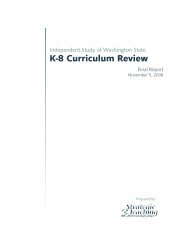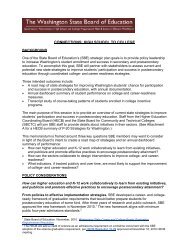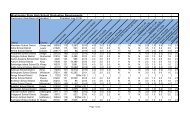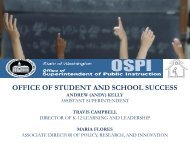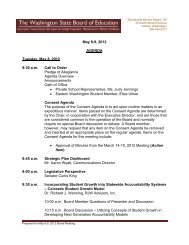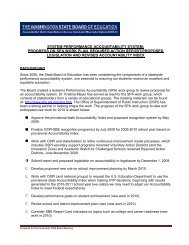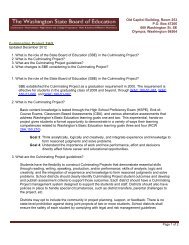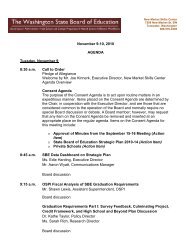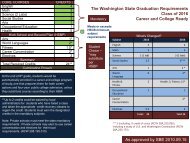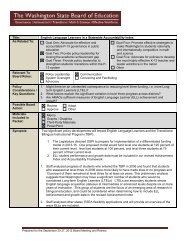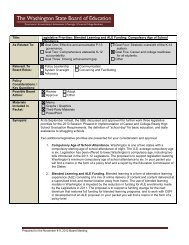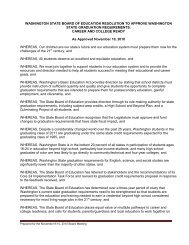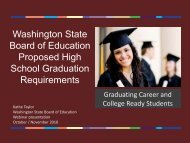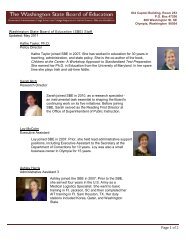Humanities (English and Social Studies)
Humanities (English and Social Studies)
Humanities (English and Social Studies)
You also want an ePaper? Increase the reach of your titles
YUMPU automatically turns print PDFs into web optimized ePapers that Google loves.
<strong>Humanities</strong> (<strong>English</strong> <strong>and</strong> <strong>Social</strong> <strong>Studies</strong>) at Delta<br />
I. Introduction – Nature of the Discipline<br />
The humanities program of study provides a vehicle for underst<strong>and</strong>ing <strong>and</strong><br />
appreciating the complexity of human endeavor. <strong>Humanities</strong> at Delta High School<br />
is a course designed to engage students in an integrated study of social studies,<br />
literature, language <strong>and</strong> communication, philosophy, <strong>and</strong> the arts. As a way to<br />
nurture imagination <strong>and</strong> creative thinking, a humanities approach provides<br />
students with an underst<strong>and</strong>ing of the connectedness of all content areas.<br />
Emphasis is placed on rights <strong>and</strong> responsibilities of the individual in society. Both,<br />
through reading about events in a historical context, <strong>and</strong> in various literary genres,<br />
students will explore aspects of human nature, human roles <strong>and</strong> behavior, <strong>and</strong><br />
human ideals. Teaching the disciplines together allows each subject to make the<br />
others more meaningful for students. The interdisciplinary approach demonstrates<br />
for students the interconnectedness of all their subjects. Thus, history supports<br />
their literary analyses, <strong>and</strong> literature supports their historical investigations.<br />
II. Overarching Goals <strong>and</strong> Purposes<br />
As students in humanities explore aspects of human nature, human roles <strong>and</strong><br />
behavior, <strong>and</strong> human ideals, the following overarching goals emerge:<br />
• Students will use critical reasoning skills to analyze <strong>and</strong> evaluate varying<br />
perspectives<br />
• Students will gather information, not as an end in itself, but to support the<br />
processes of science <strong>and</strong> research as applied in humanities<br />
• Students will acquire oral <strong>and</strong> written communication skills to articulate<br />
their own ideas in a variety of modes <strong>and</strong> for a variety of purposes<br />
• Students will read to comprehend, analyze, <strong>and</strong> evaluate literature<br />
• Students will develop an appreciation for the literary <strong>and</strong> fine arts<br />
• Students will create cross-curricular STEM-based products that support a<br />
thesis <strong>and</strong> communicate the product in an appropriate manner to their<br />
audiences.<br />
III. Course Sequence<br />
The humanities curriculum at Delta is designed to engage, motivate, <strong>and</strong> challenge<br />
students to be inquisitive, analytical, creative, <strong>and</strong> energetic thinkers, readers,<br />
writers, <strong>and</strong> speakers. Throughout their four-year humanities experience, while<br />
working to improve their writing <strong>and</strong> editing skills, students will engage in inquiry<br />
<strong>and</strong> project-based learning as they examine the development of civilizations in order
to underst<strong>and</strong> the diversity of the human experience <strong>and</strong> various types of societies.<br />
They will have the opportunity to write both creative <strong>and</strong> expository pieces with a<br />
priority placed on writing comprehensive analytical essays expressing their own<br />
ideas through clear prose. At times, literature drives the focus; at other times,<br />
history does. Always, however, the focus is on interconnectedness. Units are<br />
planned by creating essential questions designed to provoke the students’ thinking<br />
<strong>and</strong> to help them make sense of the world.<br />
<strong>Humanities</strong> 1- Exploring the Nature of Human Endeavor (2 Credits: 1<br />
<strong>English</strong>, 1 <strong>Social</strong> <strong>Studies</strong>)<br />
This introductory humanities course, a survey of social studies <strong>and</strong> language arts,<br />
explores the nature of human endeavor through a study of history, economics,<br />
civics, geography, <strong>and</strong> social studies skills. Through literature students will explore<br />
individuals’ attempts or refusal to become the best they could be. In the process,<br />
students will connect reading with writing <strong>and</strong> thinking skills for communication.<br />
Thus, they will develop a foundation for more specialized study in their subsequent<br />
three years at the school.<br />
<strong>Humanities</strong> 2-World Civilizations (2 Credits: 1 <strong>English</strong>, 1 <strong>Social</strong> <strong>Studies</strong>)<br />
Building upon the foundation of the introductory humanities course, Delta students<br />
will be guided to seek to underst<strong>and</strong> their role in their community, nation, <strong>and</strong><br />
world. Their future success will depend on their underst<strong>and</strong>ing that the world<br />
operates on a global scale. <strong>Humanities</strong> 2 includes world history, world geography,<br />
<strong>and</strong> world literature, ultimately stimulating students’ underst<strong>and</strong>ing of their roles<br />
<strong>and</strong> responsibilities in the world as they learn how all human beings are intricately<br />
<strong>and</strong> globally connected.<br />
<strong>Humanities</strong> 3-American <strong>Studies</strong> (2 Credits: 1 <strong>English</strong>, 1 <strong>Social</strong> <strong>Studies</strong>)<br />
<strong>Humanities</strong> 3 provides students the opportunity to explore the literature, history,<br />
<strong>and</strong> government of the United States. It is important for students to connect<br />
knowledge, skills, <strong>and</strong> values to civic action as they engage in social inquiry.<br />
American <strong>Studies</strong> will include experiences that provide for the study of the ideals,<br />
principles, <strong>and</strong> practices of citizenship in democratic societies. Students will engage<br />
in a wide range of experiences to underst<strong>and</strong> the diverse roles, behaviors, <strong>and</strong> ideals<br />
of America’s national character. American literature, art, <strong>and</strong> media will serve as<br />
focal points for learning <strong>and</strong> inquiry.<br />
<strong>Humanities</strong> 4 - Senior Seminar (2 Credits: 1 <strong>English</strong>, 1 <strong>Social</strong> <strong>Studies</strong>)<br />
The <strong>Humanities</strong> 4 experience will provide students with opportunities to explore a<br />
global perspective <strong>and</strong> to study literary artistry <strong>and</strong> criticism. As students engage in<br />
thoughtful reflection about history <strong>and</strong> progress as well as the trade-offs between<br />
self-interests <strong>and</strong> societal obligations, they will broaden <strong>and</strong> enhance their own<br />
abilities to think critically about a variety of issues, both historical <strong>and</strong> modern.
IV. Big Ideas<br />
At Delta, big ideas will serve as focal points for teaching <strong>and</strong> learning. These<br />
transferable, underlying concepts, principles, <strong>and</strong> theories will help students to<br />
connect discrete knowledge <strong>and</strong> skills throughout the learning process. Throughout<br />
the humanities curriculum, students will engage in learning experiences designed<br />
around potential big ideas that connect to other STEM disciplines: human nature,<br />
human roles <strong>and</strong> behavior, <strong>and</strong> human ideals both through reading about events in<br />
a historical context <strong>and</strong> in various literary genres.<br />
V. Cross-Curricular Applications<br />
Cross-curricular applications will be designed around big ideas that could be<br />
transferable to other STEM content areas: human nature, human roles <strong>and</strong><br />
behavior, <strong>and</strong> human ideals. Concepts such as communication, interactions <strong>and</strong><br />
interdependence, connections, diverse cultures, change, conflict, <strong>and</strong> character will<br />
support <strong>and</strong> inform the cross-curricular applications in the STEM disciplines.<br />
<strong>Humanities</strong> teachers will collaborate with teachers in other content areas, providing<br />
students opportunities to write in modes specific to learning objectives <strong>and</strong> intended<br />
for targeted audiences in a variety of formats, such as lab reports, grant proposals,<br />
<strong>and</strong> environmental impact studies.<br />
A potential cross-curricular application will be developed around the concept of<br />
interdependence of life. In humanities, students will engage in the analysis of<br />
demographics, economic forecasts of undeveloped, developing, developed, <strong>and</strong> wartorn<br />
countries. In mathematics, students will critique various methods of statistical<br />
experimental design, data collection, <strong>and</strong> data presentation. Meanwhile in science<br />
classes, students will describe the living <strong>and</strong> non-living factors that limit the size<br />
<strong>and</strong> affect the health of a population. Students will also explore the role of<br />
technology <strong>and</strong> its impact on st<strong>and</strong>ards of living.<br />
VI. Cornerstone to Capstone Experiences<br />
All seniors will complete a capstone project as part of their fourth year <strong>Humanities</strong><br />
Senior Seminar. This meaningful project will be designed to provide students the<br />
opportunity to interact within their community, <strong>and</strong>, as students of humanities, to<br />
demonstrate underst<strong>and</strong>ings <strong>and</strong> self-awareness of who they are. The experience<br />
will be a chance for students to apply what they will have learned to a topic that<br />
they will truly care about <strong>and</strong> to illustrate the result to a wide audience. Students<br />
may develop a core question that impacts their community. Students might ask,<br />
“How can Delta students impact human roles <strong>and</strong> behavior to improve their
community?”<br />
Presentation <strong>and</strong> reflection would accompany any humanities capstone project.<br />
Students may work independently or with a team engaging community partners as<br />
part of the process to explore their projects’ core questions. Students will submit<br />
proposals, conduct research, prepare their findings/recommendations, <strong>and</strong> give oral<br />
presentations as part of their capstone experiences. Thus, with the help of their<br />
community, students will engage in reflections about their learning.



